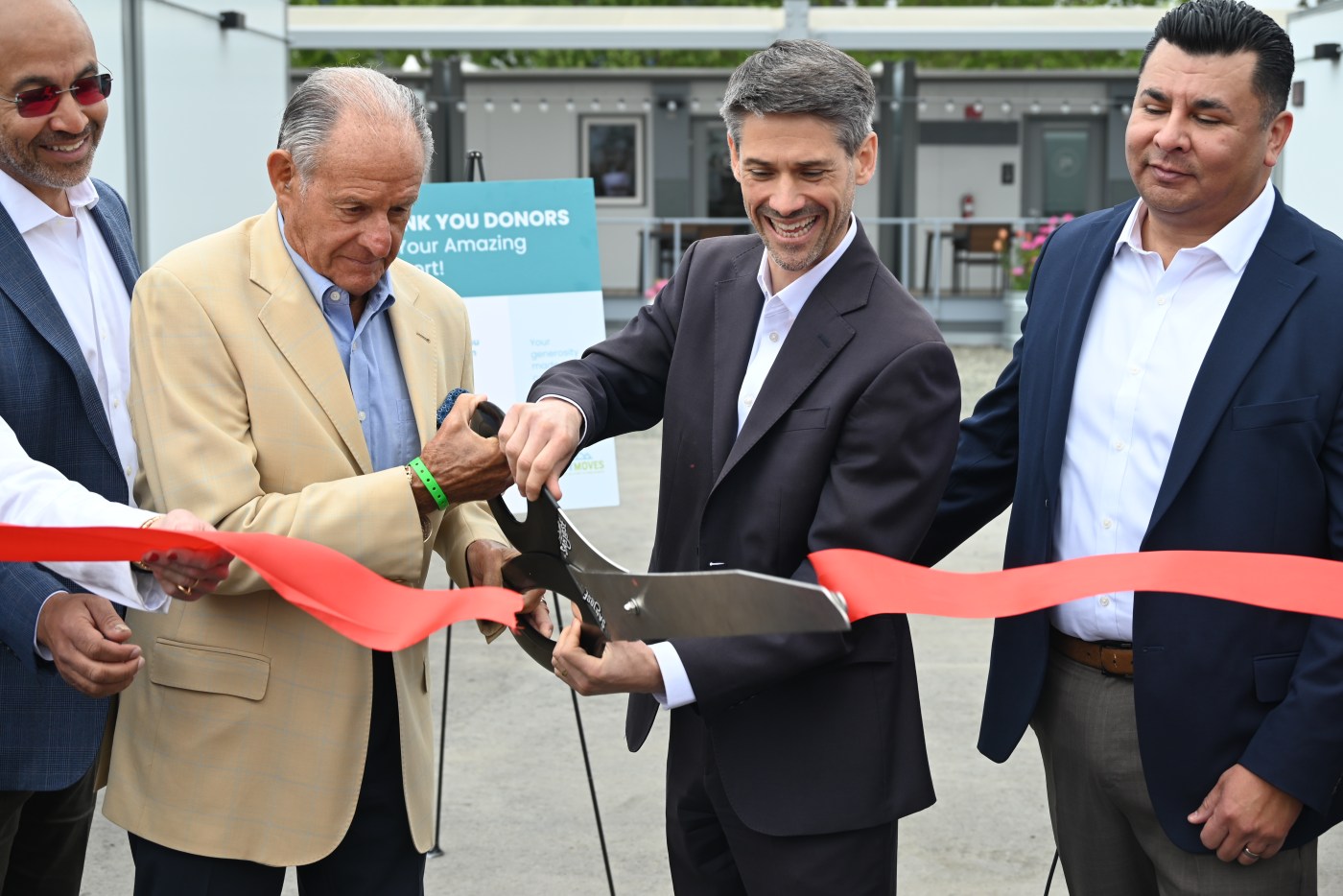With the opening of the Via del Orio interim housing community in San Jose, city leaders describe its value as more than just the 150 beds it will offer unhoused residents.
They view the site — the first to be constructed on private land — as a potential model for future developments, bringing in private sector partners and philanthropists to help the city’s efforts in solving the homelessness crisis through building interim housing more quickly and at a lower cost.
Related Articles
Is San Jose making progress on homelessness or are some of its ‘wins’ superficial?
Legislators gut bill that sought to force California counties to share city shelter costs
Supportive housing project in Oakland pushes ahead with property deal
Opinion: Criminalizing homelessness won’t fix our housing shortage
Bay Area food banks, pantries struggle with funding cuts as demand continues to rise
“It’s proof that when public, private and nonprofit partners come together around shared goals, we can get big things done and fast,” San Jose Mayor Matt Mahan said. “We have to be honest (that) the city doesn’t have the taxpayer dollars alone to solve this crisis. We need support from our county, our state, philanthropic leaders and private partners, and this site is really our first test case of using private land and showing that these kinds of innovative partnerships can work.”
The interim housing community has become a genuine team effort since the City Council approved a project delivery agreement with DignityMoves to develop the site last year.
Lacking city-owned space for interim housing projects, San Jose found some relief from philanthropists John and Sue Sobrato, who agreed to lease the two-acre Via de Oro site, located at 6370 San Ignacio Ave., for $1 per year for the next 10 years.
Sobrato indicated Thursday that the site could potentially be expanded on the property he owns if it is successful.
“If this project turns out as we all expect, we still have land next door,” Sobrato said. “This is a two-and-a-half acre site, and we can double the amount of units on the remaining land.”
San Jose has opened its latest interim housing community, as seen on April 24, 2025, at 6370 San Ignacio Ave. that will offer beds up to 150 beds for unhoused residents. (Devan Patel/Bay Area News Group)
The city also received millions of dollars in discounts and donations that helped reduce costs for sleeping units, furniture, design, and project management fees.
Along with the Sobratos, Peter and Susanna Pau with the SHP Foundation, the Valhalla Foundation, Vinod and Neeru Khosla and Preston and Carolyn Butcher were among the other notable benefactors of the project.
HomeFirst is the nonprofit provider operating the site.
With outside help, Mahan stated that the project’s building costs were close to 10% lower than the average for interim housing sites. Mahan’s office confirmed that the average cost per bed was $115,000, compared to the $130,000 average across the city’s other sites.
When the City Council approved its agreement with DignityMoves, the city initially envisioned the site opening in winter 2025.
Adding to the uniqueness of the situation, the interim housing community is fully relocatable.
The Via del Oro site is part of the city’s ambitious push to add more than 1,400 shelter spaces to its portfolio over the coming year through hotel and motel conversions, tiny home communities and safe sleeping and safe parking sites. Earlier this year, the city opened a 216-bed facility in South San Jose at Branham Lane and Monterey Road. It also recently opened up its largest safe parking site in Berryessa.
The city’s efforts to ramp up interim housing production earned praise from DignityMoves CEO Elizabeth Funk, who touted San Jose’s efforts to end unsheltered homelessness.
“I like to think of this as the beginning of the end because San Jose has embarked on what is truly a remarkable initiative to reach what we call functional zero unsheltered, which means that the city has enough beds and options available so that people no longer need to resort to sleeping on the streets,” DignityMoves CEO Elizabeth Funk said. “That’s audacious (and) that’s also not possible if they try to do it alone. It’s not they have the money, and believe me, they’ve looked, but to name a goal and define it, you’re halfway to solving it.”
Since Via del Oro opened its doors, it has welcomed nearly 70 unhoused residents, including many from a nearby encampment on Great Oaks Boulevard.
So far, unhoused residents say the new site has provided a welcome alternative to their previous living conditions and offered them hope of achieving their goals.
“It’s been awesome,” said Corrina Hernandez, who recently moved into Via del Oro after spending the last three years homeless. “It’s good to get a shower and sleep without worrying about people trying to get to you. Next, I’d like to get a job and housing.”
Zachary Plumeau, a new resident at Via del Oro who previously lived out of his truck, credited HomeFirst and its staff for his experience thus far, calling it “groundbreaking.”
“You can call me anything you want (but) you can’t call me homeless,” Plumeau said.





